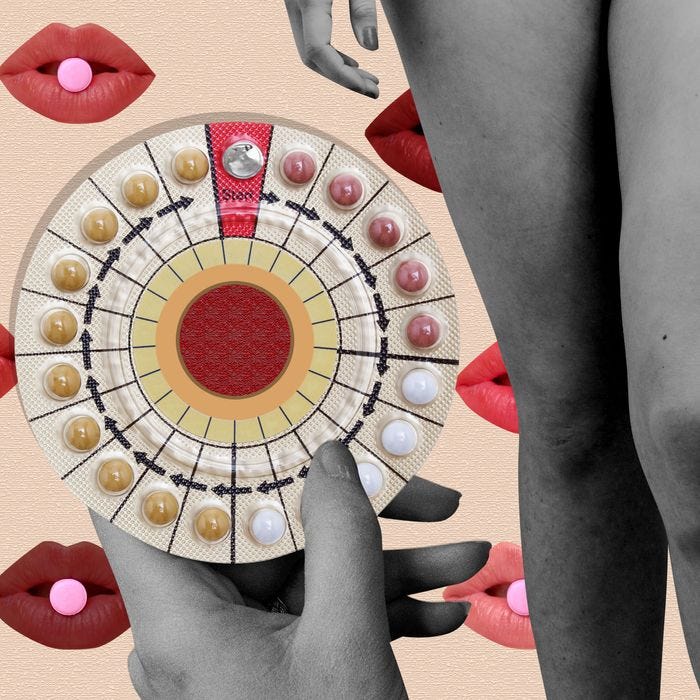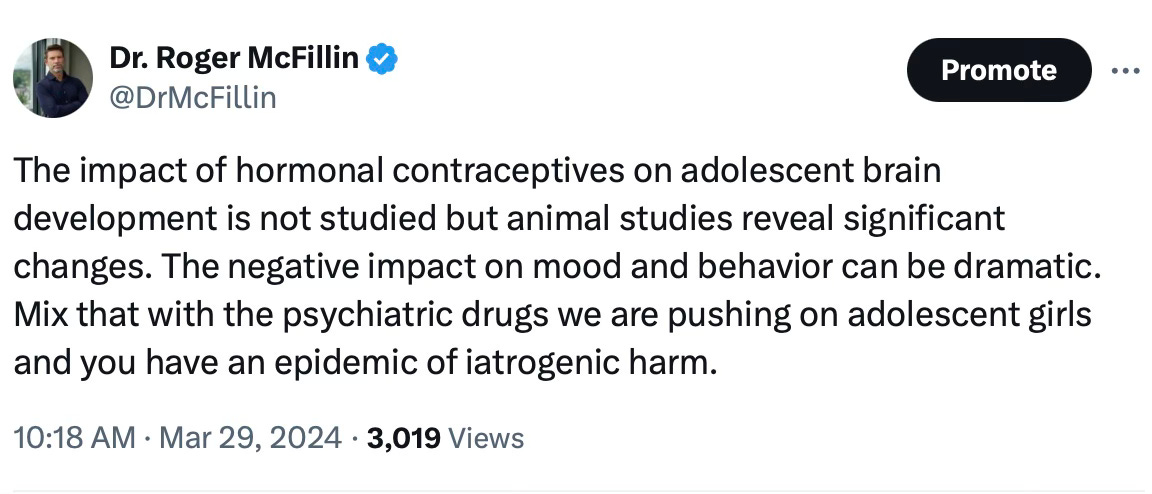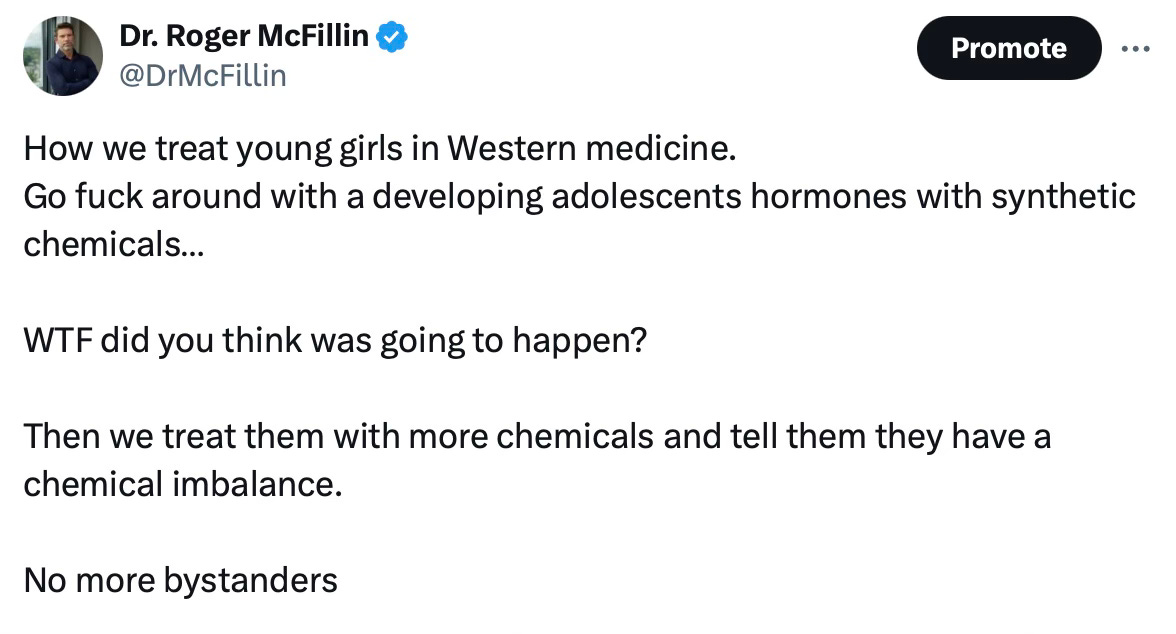The Dark Side of Hormonal Birth Control
How hormonal contraception could be hijacking teen emotions & altering their brain
If you follow my work, you're likely aware of my outspoken stance against the tendency within the medical and mental health industries to pathologize and medicalize normal ranges of mood and behavior. This pervasive trend often leads to the over-diagnosis and over-treatment of individuals who may simply be experiencing variations within the normal spectrum of human emotions and behaviors.
Adolescent females, in particular, are at greater risk of being labeled and drugged within this system. The natural hormonal fluctuations of puberty, combined with societal pressures and expectations, can result in heightened emotional responses and behavioral changes.
Emotionally, puberty is a time of heightened sensitivity, self-discovery, and emotional growth. Girls may struggle with fluctuating moods, body image concerns, and the complexities of forming intimate connections. These experiences during puberty lay the groundwork for fulfilling critical needs throughout a woman's life, shaping her understanding of herself, her relationships, and her place in the world.
However, instead of recognizing these as typical aspects of adolescent development, there is a tendency to pathologize these experiences, leading to prescriptions for mood, behavior and physical changes that would be expected during this developmental period.
It seems like critical aspects of femininity and female development are routinely labeled as psychiatric. Let’s fact it… the statistics certainly are demonstrating this.
Introducing Hormonal Contraception
Hormonal contraceptives are the most commonly prescribed form of birth control in the United States. They’re used to prevent pregnancy as well as to treat a variety of health conditions, such as acne, polycystic ovary syndrome (PCOS), premenstrual dysphoric disorder (PMDD) and to regulate periods.
Hormonal contraception introduces synthetic hormones into the body that disrupt the natural hormonal balance. Typically containing synthetic forms of estrogen and/or progesterone, these contraceptives work by altering the normal hormonal fluctuations of the menstrual cycle to prevent ovulation. However, the introduction of these synthetic chemicals can lead to hormonal imbalances, impacting mood and behavior.
The introduction of synthetic hormones through birth control methods can unleash havoc on the mood and behavior of teenage girls. For many adolescents, this disruption manifests in a whirlwind of mood swings, heightened emotional sensitivity, and unpredictable behavior.
The synthetic hormones can amplify existing emotional struggles or trigger new ones, leading to feelings of anxiety, depression, or irritability. Unfortunately, the profound impact of these hormonal changes on teenage girls' mental well-being is frequently underestimated or overlooked.
I myself had to become more vigilant to these adverse effects. I decided to deep dive into the existing literature.
I asked myself… do many pediatricians, psychiatrists, psychologists, and therapists truly consider the impact of hormonal birth control on mood and behavior? How often do therapists even broach the subject? Instead of thoroughly investigating known risks, there's a rush to slap on psychiatric labels and push psychiatric drugs.
Was I prone to misrepresenting the effects of hormonal birth control as an emotional disorder?
What Does the Science Demonstrate?
Given the insufficient information and warnings provided to most young girls and their families regarding the risks associated with hormonal birth control, it becomes imperative for those in the mental health field to undertake the ethical duty of comprehending how these synthetic hormones may influence mood and behavior.
Here is what I discovered:
Increased Risk for Depression
Teenage girls who use birth control pills are more likely to cry, sleep too much and experience eating issues than their peers who don’t use oral contraceptives, according to a recent study published in the medical journal JAMA Psychiatry. These are the exact symptoms that professionals will label as “major depressive disorder”
In a recent study, women who used contraceptive pills were at greater risk of developing depression than women who did not. The method of contraception studied was combined contraceptive pills, which contain progestogen, a compound resembling the hormone progesterone, and estrogen. Progestogen prevents ovulation and thickens the cervical mucus to prevent sperms from entering the uterus, while estrogen thins the uterine lining to hinder the implantation of a fertilized egg. Contraceptive pills increased women's risk by 73 % during the first two years of use.
According to the study, women who began to use contraceptive pills as teenagers had a 130 % higher incidence of symptoms of depression, while the corresponding increase among adult users was 92%. Teenage users of contraceptive pills still had an increased incidence of depression even after stopping using the pill, which was not observed in adult users of contraceptive pills.
Additional research has demonstrated a long-term association between adolescent hormonal contraception use and depression risk in adulthood regardless of current use. Their findings suggest that adolescence may be a sensitive period during which hormonal contraception use could increase women's risk for depression, years after first exposure.
Potential Brain Changes that Lead to Impulsivity
Scientists at The Ohio State University are exploring how common synthetic hormones used for birth control affect the prefrontal cortex, an area of the brain that continues to develop throughout adolescence.
The researchers found that myelination, the formation of protective coating on axons projecting from the main body of brain cells, increased in rats given hormonal birth control compared to untreated rats, while the number of immune cells of the brain decreased. In behavior tests, the treated rats also showed signs of impulsivity.
“We start the rats on hormonal contraceptives as soon as they go through puberty and give them throughout adolescence, and then do behavioral tasks at the cusp of adulthood. By the end of adolescence, impulsivity shouldn't be as much of a thing, but that doesn't seem to be the case – which, while highly speculative, suggests hormonal contraceptives might be stalling brain maturation."
Benedetta Leuner, co-senior author of the study and associate professor of psychology at Ohio State
Increased Suicide Risk
In a recent study in the American Journal of Psychiatry, Skovlund and colleagues provide an elegant and eye-opening report of their finding that hormonal contraception use doubles the risk of suicide attempt, and triples the risk of suicide. Their conclusions were quite clear “Use of hormonal contraception was positively associated with subsequent suicide attempt and suicide. Adolescent women experienced the highest relative risk.”
Increased Risk of Mood and Autimmune Disorders
UCLA-led study found hormonal contraceptive users processed stress differently at the molecular and psychological level. The study, published in the journal Brain, Behavior, and Immunity, is the first to directly measure differences in hormonal contraceptive users’ and non-users’ psychological and immune responses to socially stressful situations. Women using hormonal contraceptives (HCs) exhibit numerous signs of chronic inflammation, including elevated C-reactive protein levels and greater risk of developing mood and autoimmune disorders.
What’s the Bottom Line?
I spent some time reviewing the research literature for hormonal contraceptives. I could have posted hundreds of studies but chose to only include a few. Here is what is clear.
We are prescribing hormonal birth control to treat a variety of health conditions, such as acne, polycystic ovary syndrome (PCOS), and premenstrual dysphoric disorder (PMDD). It was difficult to know how many teens are now on some form of synthetic hormones.
The synthetic hormones can amplify existing emotional struggles or trigger new ones, leading to feelings of anxiety, depression, or irritability.
Teenage girls who use birth control pills are more likely to cry, sleep too much and experience eating issues than their peers who don’t use hormonal birth control.
Teenagers on hormonal birth control had a 130 % higher incidence of symptoms of depression.
Teenage users of contraceptive pills still had an increased incidence of depression even after stopping using the pill, which was not observed in adult users of contraceptive pills.
Hormonal contraception use doubles the risk of suicide attempt, and triples the risk of suicide. Use of hormonal contraception was positively associated with subsequent suicide attempt and suicide. Adolescent women experienced the highest relative risk.
Hormonal contraceptives taken by adolescents may influence development of the brain in a way that alters the recognition of risks and increases impulsivity.
Women using hormonal contraceptives (HCs) exhibit numerous signs of chronic inflammation, including elevated C-reactive protein levels and greater risk of developing mood and autoimmune disorders.
So let me get this straight? Teenage girls, already experiencing the expected mood and behavioral changes associated with puberty, are placed on synthetic hormones that disrupt the normal hormonal shifts associated with this key developmental period. The documented mood changes are then inaccurately labeled as psychiatric disorders in medical and mental health settings, leading to prescriptions for antidepressants that at least double the risk of suicide.
Excuse my language but…
We are awake.








I think many doctors genuinely don’t know about the dangers of adhd and depression drugs… but that is not the case for birth control. Based on conversations I’ve had, I honestly get the impression that most pediatricians 100% know hormonal contraception is harmful but push it anyway because they genuinely loathe the thought of young women getting pregnant and do not trust/believe any teen not to have sex all the time. Of course they lie to the patient/family about the risks but they know the risks themselves (unlike SSRIs, where my impression is they aren’t aware of the risks at all).
The anger I feel for how girls are treated cannot be understated. At 17 my mother pushed me to get on contraception. I had JUST started my period at age 16 and had a few cycles that were irregular, heavy, and crampy (probably normal). My mom and my doctor told me the pill would solve all my problems, that it would "fix" my mood swings, cramps, and heavy bleeding. That seemed pretty good, and I was not given any downsides. Since I was not good at remembering to take a pill, the doctor put me straight on Depo Provera at 17 years old. He let me stay on that for over 12 years. It took two years coming off of it for my cycle to return in any fashion and I was lucky that after that I got pregnant. I developed a uterine prolapse after my first baby which the doctor who diagnosed it explained was likely due to how long I was on a progesterone based birth control. While on contraception I believed I was asexual. I have no libido to speak of and no interest in sex, I also struggled with mood, depression, anxiety, and panic attacks. ALL of this has resolved over time since having come off of it. I have been fortunate to have 3 healthy babies, but my cycles are still out of whack, and I will have to deal with the prolapse for the rest of my life. If instead of sticking a birth control band aid to address my mensural issues, my doctor did things like consider my nutritional status, life style, and helped me manage thing with more natural remedies I would not have needed anything else. The fact that nobody has the curiosity to ask WHY a girl has PCOS, or heavy bleeding, or endometriosis, and to do ANYTHING to help address the root cause of those things blows my mind. The mensural cycle is a vital sign and it is not normal to have cycle issues, if you do, something else is wrong that will likely impact other things in your life and health, so we should be trying to get to the root cause, not just medicating symptoms.